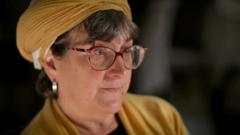Sondra Baras and other settlers view Trump's presidency as a pivotal moment for the future of settlements in a region they regard as historically Jewish land.
Israeli Settlers Eager for Change Under Trump Administration

Israeli Settlers Eager for Change Under Trump Administration
With Trump’s return to power, Israeli settlers in the West Bank intensify calls for territorial annexation.
In the hills of Karnei Shomron, a settlement in the occupied West Bank, Israeli settlers are feeling optimistic following the election of Donald Trump as US president. Residents like Sondra Baras, who has called this area home for nearly four decades, feel a deep connection to the land, which they frame as part of Biblical Judea and Samaria rather than occupied territory. This sentiment is reflected in the local narratives that blur the lines between the State of Israel and the region it captured during the 1967 Middle East war.
Baras expresses her desire for expanded sovereignty in the West Bank, buoyed by Trump’s administration which includes supporters of Israeli claims to the territory, such as Mike Huckabee, Trump's nominee for ambassador to Israel. Huckabee commented on the notion of occupation by asserting the historical ties of Jews to the land, reflecting a broader sentiment among some settlers.
Yisrael Gantz, a leader of the settlement council in Karnei Shomron, notes a shift in the US's tone, especially after the recent Hamas attacks on Israel, leading him to believe that the pursuit of sovereignty is gaining traction. However, he concedes that immediate annexation is not yet forthcoming and that the vision of a two-state solution appears increasingly dim.
While President Joe Biden continues to support Palestinian statehood, momentum is building among Israeli officials, including Finance Minister Bezalel Smotrich, who advocates for concrete annexation steps in the coming years. This provokes a range of responses, with some settlers believing that Palestinians who do not wish to remain in Israel should leave, while acknowledging that such moves may provoke opposition.
Yet, many Palestinians see the annexation discussions as irrelevant, given the existing realities on the ground. Mohaib Salameh, a Palestinian living on the outskirts of Nablus, shares the grim details of having his home demolished under Israeli court orders. He voices concern that the ongoing settlement expansion and increasing violence are part of a broader policy aimed at displacing Palestinians.
Reports indicate that violent actions by settlers against Palestinian communities are on the rise, leading to the expulsion of numerous communities under the guise of territorial claims. Salameh asserts that no US president has ever genuinely protected Palestinian interests, and doubts remain about Trump breaking from this historical pattern.
As the political landscape shifts in the US, including Trump's views on Israel, the implications for both Israelis and Palestinians in the West Bank are vast and potentially transformational.






















